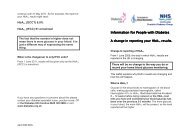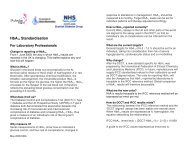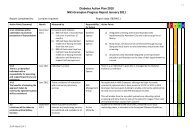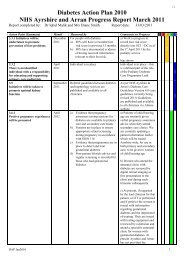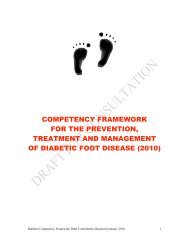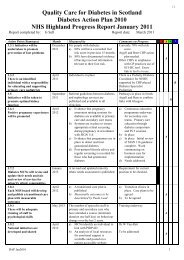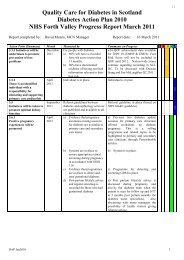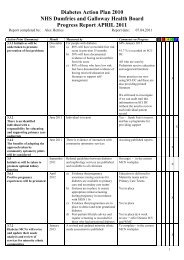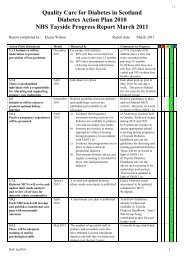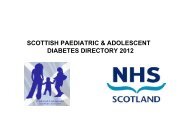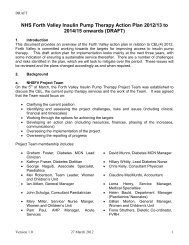DIABETES ACTION PLAN 2010
Diabetes Action Plan 2010 - Scottish Government
Diabetes Action Plan 2010 - Scottish Government
- No tags were found...
You also want an ePaper? Increase the reach of your titles
YUMPU automatically turns print PDFs into web optimized ePapers that Google loves.
<strong>DIABETES</strong> <strong>ACTION</strong> <strong>PLAN</strong> <strong>2010</strong><br />
QUALITY CARE FOR <strong>DIABETES</strong> IN SCOTLAND<br />
Type 1 diabetes<br />
Type 1 diabetes is a high risk state for both the woman and her foetus because of increased<br />
risks of spontaneous abortion, ketoacidosis, severe hypoglycaemia, pre-eclampsia, premature<br />
labour, polyhydramnios, late intrauterine death, foetal distress, obstructed labour and<br />
congenital malformation. Infants of mothers with diabetes need careful monitoring after<br />
birth. Complications of diabetes such as retinopathy can worsen during pregnancy.<br />
Type 2 diabetes<br />
In the national audits the number of pregnancies in women with type 2 diabetes was<br />
fewer than in women with type 1 diabetes, but during the consultation several groups<br />
commented on an increasing proportion of pregnancies in type 2 diabetes. Contributing<br />
factors could include the increasing prevalence of obesity, the increasing age and a change<br />
in ethnic composition of the pregnant population. Management prior to and during<br />
pregnancy should follow the same intensive programme of metabolic, obstetric and<br />
neonatal supervision as for women with type 1 diabetes, since similar adverse outcomes<br />
are recognised in type 2 diabetes.<br />
Gestational diabetes<br />
SIGN Guideline 116 emphasises the need to recognise women with gestational diabetes,<br />
the prevalence of which is increasing, in order to optimise pregnancy outcomes by<br />
evidence-based management interventions. Screening for gestational diabetes identifies a<br />
higher risk group for future type 2 diabetes. Lifestyle interventions could prevent<br />
metabolic progression to established diabetes.<br />
Actions we will take:<br />
1. NHS Boards, through their diabetes MCNs, will ensure<br />
• awareness raising sessions on diabetic pregnancy are promoted in both primary<br />
and secondary care for healthcare professionals to improve pre-pregnancy and<br />
ante-natal diabetes care and glycaemic control in women with diabetes<br />
• collaboration between multidisciplinary pregnancy care teams and the local<br />
Diabetic Retinopathy Screening programme so that systems are in place for<br />
appropriate retinal screening during pregnancy<br />
• programmes are in place to detect and treat gestational diabetes during pregnancy<br />
• Following delivery those with gestational diabetes mellitus should have:<br />
o<br />
o<br />
lifestyle advice with the aim of reducing type 2 diabetes mellitus<br />
regular screening with the aim of early detection of type 2 diabetes mellitus.<br />
2. SDG, along with NHS Quality Improvement Scotland and other<br />
national organisations, will investigate the feasibility of repeating in 2012<br />
the national pregnancy audit in light of SIGN Guideline 116.<br />
Quality Healthcare Indicators: safe; person-centred.<br />
31



